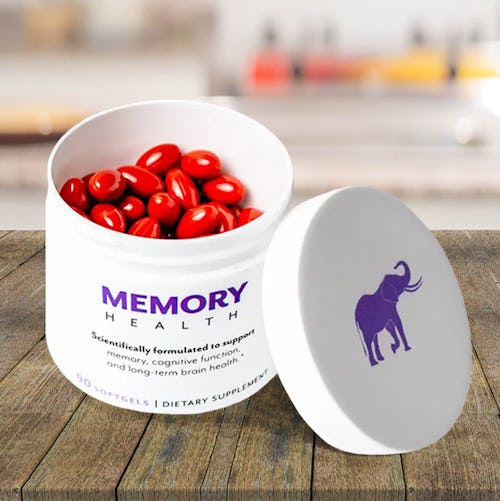
I can be pretty absent-minded from time to time. I often set reminders on my phone for the littlest things — from taking out the trash to watering my plants. If you’re anything like me, those little bouts of forgetfulness probably remind you that you want to do everything you can to keep your brain and memory in good repair for as long as possible. That’s why I was intrigued by Memory Health — a dietary brain booster supplement that’s patented to support memory and help prevent neurodegenerative disease.
What is Memory Health?
Memory Health is a supplement formulated to help improve memory functions and slow down cognitive decline. Developed by a group of leading scientists studying the critical role of nutrition in brain health, Memory Health utilizes natural ingredients that contain chemical compounds already found within the human brain. These nutrients may help protect the brain against neurodegenerative diseases while supporting overall cognitive health. Personally, I’m a fan of nutritional supplements because they’re quick and hassle-free — perfect for my busy lifestyle — and adding this to my vitamin arsenal felt like something worth exploring, so I put on my researcher hat and dug into the science.
Memory Health uses three natural, science-backed ingredients to support brain health: omega-3 fatty acids, carotenoids, and vitamin E. The caplets can be taken whole, or — for the pill-averse — blended into a smoothie.

Meet the ingredients
Memory Health’s cognitive supplement capitalizes on three powerhouse ingredients that help boost cognitive function. Here’s a rundown on what each one does:
Omega-3 fatty acids: anti-inflammatory nutrients that support brain health
Omega-3 fatty acids — specifically eicosapentaenoic acid (EPA) and docosahexaenoic acid (DHA) — are almost exclusively found in the oil extracted from fatty fish such as anchovies, mackerel, and salmon. Now, I knew fish oil could help strengthen hair and nails, but it turns out that studies show this anti-inflammatory compound may improve brain function in cases of mild cognitive impairment and age-related cognitive decline — and the earlier you start, the better the results. And if you’re someone like me who doesn’t eat fish very often, getting your omega-3s in capsule form is an easy route to reaping their benefits.
Carotenoids: a plant-derived compound that defends the brain against free radicals
You can thank carotenoids for producing the vibrant yellow, red, and orange hues in vegetables, fruits, and even flowers. There are over 600 types of known carotenoids, and Memory Health is formulated with two types: lutein and zeaxanthin, which can be found in green, leafy vegetables and egg yolks — just another reason to eat a Cobb salad — but they can also be ingested in the form of a dietary supplement. (In fact, Memory Health harvests their carotenoids from marigold flower petals.) Lutein and zeaxanthin are powerful antioxidants that defend your body against unstable molecules known as free radicals, which are found in air pollution, UV rays, and industrial chemicals, among other things. And since free radicals may be responsible for functional cognitive decline, these carotenoids may help protect your brain.
Vitamin E: an antioxidant-rich ingredient that may slow down cognitive decline
Another all-star antioxidant in the mix? Vitamin E. Studies have shown that high-plasma vitamin E levels in the body are associated with better cognitive performance, and may even help prevent or delay the decline of cognitive functions. Memory Health’s formula utilizes alpha-tocopherol vitamin E, which is easy for the body to absorb and make use of.
The results from clinical studies
Of course, any good supplement that helps with memory needs to be backed by clinical research and results. Through an independent, randomized study published in Clinical Nutrition, a team of scientists concluded that increasing nutritional intake of Memory Health’s key ingredients — omega-3 fatty acids, xanthophyll carotenoids, and vitamin E — “may prove beneficial in reducing cognitive decline and dementia risk in later life.” The research also showed “improvements in working memory” among cognitively healthy older adults who supplemented their diet with these three ingredients over the course of 24 months. Interestingly enough, the researchers also found that the combination of these specific substances produced particularly effective results — in other words, the whole is greater than the sum of its parts.
An independent clinical study found that increasing intake of the key nutrients used in Memory Health may help improve working memory and reduce cognitive decline during aging.

How do I take Memory Health & what can I expect?
The recommended dosage is three capsules a day, which can be either swallowed with water or blended into a smoothie. The food-grade gelatin capsules are infused with lemon oil, giving them a surprisingly pleasant taste. (Flavor is very important to me when it comes to swallowing any sort of capsule, so I appreciate the attention to this aspect of the overall experience.) With daily use, the brand says you can expect to start seeing results in about three months, and each jar includes a 30-day supply of 90 capsules.
Is it safe for everyone?
In general, yes, but it’s not a good fit if you’re vegan or vegetarian, as fish oil and gelatin are both ingredients in the capsules. You may also want to forego dietary supplements if you’re pregnant or breastfeeding until you check in with a medical professional. Beyond that, Memory Health capsules are made with natural, non-GMO ingredients and are paraben-free. They’re also Supplement Certified, which means the ingredients listed on the bottle are what you’re actually taking.
It’s also important to note that while Memory Health may improve cognitive function, it is not a cure for neurodegenerative diseases such as Alzheimer’s and other forms of dementia. If you have any concerns or questions about nutritional supplements — or your brain health — it’s always a good idea to check in with your doctor.
Studies referenced:
Stahl, W. (2003, December). Antioxidant activity of carotenoids. Retrieved from https://www.sciencedirect.com/science/article/abs/pii/S009829970300030X
Poon, H.F., Calabrese, V., Scapagnini, G., Butterfield, D.A. (2004, May 20). Free radicals and brain aging. Retrieved from https://pubmed.ncbi.nlm.nih.gov/15182885/
La Fata, G., Weber, P., Mohajeri, M.H. (2014, December). Effects of Vitamin E on Cognitive Performance during Aging and in Alzheimer’s Disease. Retrieved from https://www.ncbi.nlm.nih.gov/pmc/articles/PMC4276978/
Power, R., Nolan, J.M., Prado-Cabrero, A., Roche, W., Coen, R., Power, T., Mulcahy, R. (2022, February). Omega-3 fatty acid, carotenoid and vitamin E supplementation improves working memory in older adults: A randomised clinical trial. Retrieved from https://www.sciencedirect.com/science/article/pii/S0261561421005537







